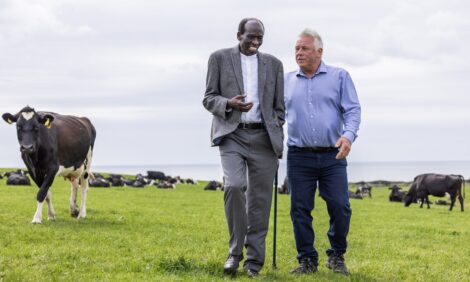



Challenging Developments For EU Dairy
The European Dairy Association (EDA) discusses fairness in trade relations, biotechnology and its potential impact, and the generic promotion of milk, as it picks three challenging topics for the EU dairy sector at the World Dairy Forum (WDF), Luxembourg.WDF participants recognised the need for a code of principles against unfair practices in trade, stressing however upon the fact that the development of such a voluntary ‘code’ should remain the effort of a wellstructured cooperation between various stakeholders, an observation totally in line with the remark made by M. Galaski (AIM) who declared that cooperation along the value chain would benefit all parties involved.
Application of biotechnology with dairy cattle remains controversial, but in order to meet the growing demand for food products in the decades to come, biotechnical increase of productivity should be considered. Delegates agreed with the observation that application of new biotechnologies in animal based food products can increase milk production sustainably and safely, but that needed extensive regulation of the technology remains difficult at this stage. Any technological innovation in the food business needs to take food safety and consumer acceptance into account.
Generic promotion of milk is considered to be an important tool for positioning EU dairy products, both by the dairy processors and by the policymakers. The campaign ‘Milk, Nutritious by Nature’, coordinated by European Economic Interest Grouping (EEIG) European Milk Forum, will be the first multi-country generic milk information campaign in Europe, and is set to begin before the end of this year.
At EU level, priority will be given to informative projects on multi-country level, highlighting the high quality standards under which EU food products are being produced and processed.
This year’s discussions and observations unveiled the challenges ahead for the EU dairy sector. It is clear that fairness in trade, a correct use of biotechnology and increased generic milk promotion on EU level will play a key role in the further development of the dairy sector throughout Europe.
World Dairy Forum Report
A speech by Luxembourg’s Minister of Agriculture, Mr Roman Schneider, opened the World Dairy Forum. He thanked EDA and Assifonte for organising the event in Luxembourg, and underlined the relevance of the dairy sector for Luxembourg as well as the fact that milk is essential for human health.
Mr Schneider highlighted the importance of recognising the value of European dairy products on a worldwide level, but that this recognition depends on a good functioning of the dairy supply chain. He said that it was therefore crucial that good conditions for an efficient dairy market post 2015 were created. He also mentioned that the transition period from now until 2015 raises particular concerns in Luxembourg.
Mr Schneider’s opening speech was followed by a contribution from Mrs Astrid Lulling, MEP for Luxembourg. Mrs Lulling focused on the same issue as Mr Schneider, i.e. the difficulty of organising a soft landing in 2015. Mrs Lulling expressed her dissatisfaction with the Nicholson Report (Dairy Package) adopted by the EP ComAgri in June, and especially with the rejection of amendments concerning the super levy.
Mrs Lulling is fully aware that the liberalisation of the dairy market will continue, but – as an MEP for Luxembourg – she asks for attention for the dairy processors and producers in smaller countries; in this context she is of the opinions that the proposal should respect the present structure of cooperatives and that the rules about contracts should not be applied to small countries.
For each of the topics on the agenda, EDA invited three renowned speakers.
Retailers, the other participants in the dairy supply chain
This session was opened by Mr Alain Galaski, Director General, European Brands Association (AIM), presenting the brand manufacturer’s perspective.
Mr Galaski underlined the importance of fairness in commercial relations. According to him, fairness creates the trust, cooperation and business continuity that are critical to competitiveness.
The core of his presentation touched on the multi-stakeholder dialogue (all links in the supply chain represented) on good and fair practices, that was initiated earlier this year, as part of the Commission’s High Level Forum. The result so far is the development of a framework in which the principles of good practice in vertical trading relationships are outlined; the implementation of these principles needs now to be coordinated with the European Commission.
This framework remains voluntary and the main condition for its success is credible, cost-effective implementation. Mr Marc Jansen, Director CBL (Dutch Food Retailers Association), representing Eurocommerce, began his contribution by repeating the mission of the retailer, i.e. providing consumers with the right product at the right place, at the right time and at the best price.
Retailers can only fulfil their mission if they can rely on stable supply chains in terms of volumes, prices and quality, he said. Mr Jansen underlined that all parties involved in the supply chain have a common interest in more competitiveness, more innovation, and meeting consumers’ interests.
Mr Jansen also referred to the multi-stakeholder dialogue as a means of cooperation which will in the end create value and benefit for all parties.
In a video message, Mrs Anna Maria Corazza Bildt, MEP from Sweden, addressed the delegates at the WDF with messages on the importance of the promotion of a fair retail marketing in Europe, on the recent vote of the so-called ‘Six Pack’, the Single Market Act, in which European growth is stimulated by internal market completion and simplified ways to operate for the entrepreneur.
She also mentioned her recent report in which she calls for decreasing trade barriers and burdens in Europe, a development which is necessary for the promotion of retail in Europe, because of increasing protectionism. Dialogue is the way to go, according to MEP Corazza Bildt.
Various stakeholders have joined forces in developing a code of conduct for fair practices in commercial and trade relations. This development resulted so far in a framework of principles, which awaits implementation in liaison with the European Commission. All stakeholders should cooperate in this development towards fair practices and fair retail marketing in Europe, since it will bring value to all parties involved.
Biotechnology: innovations creating opportunities and challenges for the dairy sector
Session two was opened by Proffesor Dr Heiner Niemann, Friedrich Loeffler Institute. He explained that methods for genomic analyses for dairy cattle will become increasingly available and less expensive. The genomes of most farm animals have already been sequenced and annotated.
As well, Somatic Cell Nuclear Transfer (SCNT), a cloning technique, has also been developed to the level of practical application; this means that transgenic farm animals now can be produced by a variety of technologies.
In the near future, pluripotent cells can be used on farm animals, which will provide again new options for a targeted creation of animals with new genetic characteristics. According to Dr Niemann the way is open for a targeted and diversified dairy production in the future, thanks to the application of technology.
Mr Brian Rittgers from Elanco started his contribution by demonstrating the growing global demand for safe, affordable and sustainable food. By 2050 the world will need 100 per cent more food and 70 per cent of this food will need to come from efficiency-improving technology.
In the US, technology has been vital for the improvement of dairy productivity; technology also generated a more sustainable production of milk. Mr Rittgers concluded by stating that technology is necessary if we want to fulfil the need for food by 2050, and that technology moreover protects three basic rights: the basic right for food, the consumer right for choice, and sustainability, an environmental right.
Head of Unit for food hygiene at DG SANCO, Mr Koen Van Dyck, completed the speakers’ panel for this section and tackled the question whether EU policy-makers should be reluctant vis-à-vis the use of new technologies in food production.
Mr Van Dyck answered by giving an overview of the various existing initiatives, measures and regulations of the EU guaranteeing the safety of the food production process: the general principles of food safety, EFSA, additives (food/feed), labelling requirements, and training programmes for better and safer food. He underlined that technological innovation in the food business must always take food safety into account.
A targeted and diversified dairy production for the future is made possible by cloning and other technological innovations. In the US, technology has been crucial for the improvement of dairy productivity. With the growing worldwide demand for safe food products, technology aimed at improving efficiency might be the solution to meet that demand in the decades to come; hence the need for a clear EU policy on cloning and other biotechnology-driven innovations in the field of cattle production.
Generic Promotion: working on the positioning of EU dairy products
The last session was opened by Mr Laurent Damiens, Marketing Director at CNIEL. Mr Damiens focused in his presentation on the activities of the European Milk Forum (EMF), a European Economic Interest Grouping aiming at reinforcing the level of milk and dairy consumption in Europe.
Mr Damiens presented the EMF’s first project, a PR campaign on ‘Milk, Nutritious by Nature’, a project which will be kicked off in the weeks to come. Mr Damiens concluded his speech by underlining the added value from the EMF: shared resources, effective communications, and the capacity to obtain EU funding.
Mrs Stella Scarlis from Agropromotion presented experiences with a dairy promotion programme outside the EU. She described the ‘EU Cheese Please’ project, a programme aimed at the promotion of cheeses produced in Bulgaria and targeted at the Russian market.
The objective of this programme is to raise the consumption of Bulgarian cheeses in Russia by providing information and by raising awareness of the quality of the cheeses. The programme is still running, but Mrs Scarlis already gave an estimated quantitative and qualitative impact, both very positive for the overall image of European cheeses outside the EU.
Mr Hans-Erwin Barth, Head of Unit at DG Agri, presented ‘Promoting the tastes of Europe’, a Green Paper looking at how to shape a more targeted and more ambitious strategy for the future, which will make clearer to consumers – both in the EU and beyond - the quality, traditions and added-value of European agricultural and food products.
Aimed at revising the existing communication and promotion schemes, DG Agri published a Green Paper and launched a public consultation: a multi-faceted questionnaire looking for the opinions of various stakeholders: consumers, producers, distributors and official authorities.
In this open consultation, of which the results should lead to a revised promotion policy, the various stakeholders can give their opinion (until 7 October 2011) on the general features of the future policy to put in place, the aims and measures for the internal and external market, and the content and rules for management and implementation.
Key challenges to define the future policy include high EU added value, the consistency, the origin, list of products, brand names and beneficiaries, and the willingness to keep it simple and effective.
Information and generic promotion become increasingly important in today’s Europe. EU regulations are being adapted to pave the way for more efficient information campaigns on European products. Multi-country initiative European Milk Forum has understood this message and is about to launch a first campaign on the nutritious benefits of milk.
While giving priority to multi-country projects in this context, the EU will put the focus on information, highlighting the high quality standards under which its farmers and industries are producing and processing. Closing the World Dairy Forum 2011, Mr Buck thanked all speakers for their compelling contributions and the audience for their lively debate.


